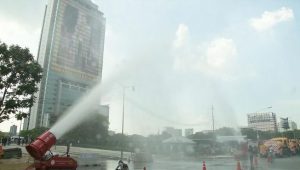Bangkok, famous for attracting tourists from all over the world, is facing a serious issue: air pollution. This week, about 103 schools remained closed due to critical levels of smog affecting the Thai capital. For this reason, authorities issued recommendations to work from home and avoid outdoor activities.
Bangkok Governor Chadchart Sittipunt pointed out that the closures are necessary, as conditions have not improved and the Air Quality Index (AQI) is expected to remain at harmful levels for a few more days. Currently, the AQI stands at 137 points, considered unhealthy for sensitive groups.
PM2.5 particles, the most harmful to health, are recording concentrations of 50 mcg/m³, exceeding the health limit of 37.5 mcg/m³ set by Thailand. According to the World Health Organization (WHO), prolonged exposure to these particles can cause respiratory illnesses, cardiovascular diseases, and cancer.

Emergency Measures Due to Smog
To mitigate the effects of pollution, authorities have taken the following measures:
- Working from home until Friday.
- Restrictions on heavy truck traffic have been implemented.
- Increased warnings about reduced visibility due to smog.
Air pollution tends to worsen in Thailand between November and April, coinciding with the dry season. Factors such as agricultural stubble burning, transportation emissions, and factory smoke contribute to the issue.
Fires and Prevention
Governor Chadchart highlighted that fires were more frequent this year compared to the same period in 2024, worsening the situation. He urged citizens to report any burning in their communities and to wear masks when going outside.
Air pollution in Bangkok not only affects daily life but also puts the health of its residents at risk, who must now adapt to extraordinary measures while a solution to this recurring problem is sought.

New Delhi: the city where breathing is a life risk
Winter in New Delhi, the city with the most polluted air in the world, has become a nightmare, as many people, when leaving their homes, cannot see beyond their hands, feel their eyes irritated, and run out of breath when trying to walk faster.
These symptoms are a consequence of the environmental pollution in the Indian capital, which has become the epicenter of one of the most serious environmental crises on the planet. With over 30 million inhabitants, this city presents high levels of pollution that turn the air into a toxic bubble, endangering the health and lives of millions of people. According to a recent study by the Karolinska Institute, 11.5% of deaths in Delhi are directly attributed to poor air quality, accounting for about 12,000 lives lost per year.
During winter, this issue becomes a real concern, as Delhi’s Air Quality Index (AQI) reaches alarming levels, exacerbated by a natural phenomenon called thermal inversion, which traps pollutants near the ground. Last November, the AQI reached 828, far exceeding the established maximum measurement limits (500). This dense air laden with fine particles (PM2.5) not only affects the lungs but also penetrates the bloodstream, significantly increasing the risk of respiratory and cardiovascular diseases.
Have you visited our YouTube channel yet? Subscribe now!

